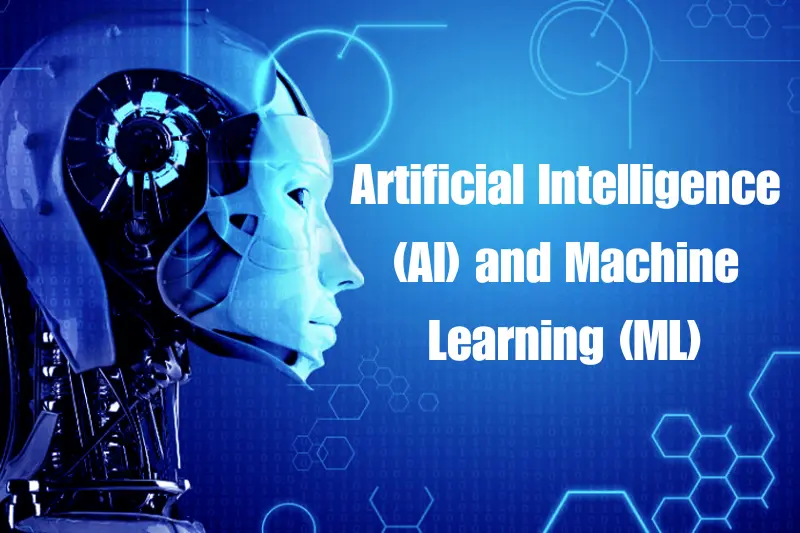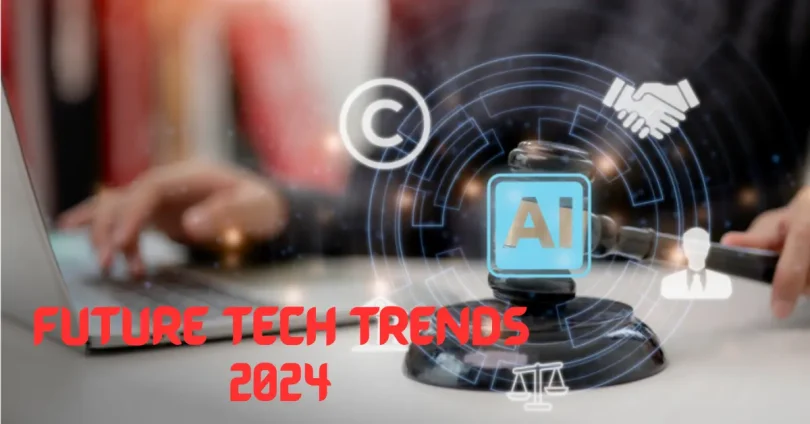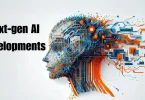The year 2024 is expected to be a groundbreaking one for technology, as new advancements, innovations, and disruptions continue to unfold. From the rapid evolution of Artificial Intelligence (AI) and Quantum Computing to the rise of the Metaverse and more sustainable green technologies, future tech trends 2024 will have a profound impact on industries, societies, and everyday lives. In this article, we explore the most significant future tech trends 2024 that will shape the coming years.
1. Artificial Intelligence (AI) and Machine Learning (ML)
 Artificial Intelligence and Machine Learning have been transforming industries for years, but in 2024, these technologies will continue to advance and permeate every aspect of our lives. AI’s ability to mimic human cognition and perform complex tasks will revolutionize industries such as healthcare, finance, customer service, and even entertainment.
Artificial Intelligence and Machine Learning have been transforming industries for years, but in 2024, these technologies will continue to advance and permeate every aspect of our lives. AI’s ability to mimic human cognition and perform complex tasks will revolutionize industries such as healthcare, finance, customer service, and even entertainment.
Key Developments in AI:
- Generative AI: In 2024, generative AI will reach new heights. Models like OpenAI’s GPT-4, DALL·E, and other advanced tools will continue to grow in sophistication. These systems will be capable of creating more realistic and personalized content, including text, images, music, and video. Businesses in marketing, media, and education will increasingly rely on AI for content creation, while creators will use AI for everything from storytelling to design.
- AI-Driven Healthcare: AI will play a major role in improving diagnostics, treatment planning, and personalized medicine. Machine learning models will help identify patterns in medical data, enabling early diagnosis of diseases such as cancer and neurodegenerative conditions. AI tools will also assist in drug discovery, reducing the time and costs required to develop new medications.
- AI-Powered Automation: As businesses aim for greater efficiency, AI will become the core driver of automation across various sectors. From intelligent customer service chatbots to AI-powered robotic process automation (RPA) in supply chains, companies will continue to streamline operations by automating repetitive tasks. This trend will reduce operational costs, improve speed, and allow employees to focus on more strategic activities.
- Ethical AI: With AI becoming more pervasive, ethical concerns related to privacy, fairness, and transparency will be front and center. In 2024, we can expect more global conversations and regulatory frameworks around the ethical use of AI. Companies will be under increasing pressure to ensure that AI models are transparent, unbiased, and compliant with data protection laws.
You may also like to read this:
Next-Gen AI Developments: Trends To Watch In 2025
How Quantum Computing Will Change The World?: A Guide
Top Best Future Tech Gadgets To Watch In 2024 You Need
The Latest Innovations In Technology Shaping Healthcare
What Is The Future Of AI And Machine Learning? In 2025?
The Role Of Nanotechnology In Future Tech: Healthcare Impact
How AI Is Shaping The Future Workforce? In 2025
2. Quantum Computing: Paving the Way for a New Era of Computing
Quantum computing is a game-changer that could redefine the computational power we currently rely on. While still in its early stages, by 2024, quantum computing will begin to make a real impact on industries such as cryptography, material science, and artificial intelligence.
Key Developments in Quantum Computing:
- Quantum Supremacy: In 2024, quantum computers may achieve “quantum supremacy” in solving problems that classical computers cannot. These include complex simulations that are essential in fields like drug discovery and climate modeling. Quantum computers will have the potential to process vast amounts of data in parallel, offering solutions to problems that were previously unsolvable with traditional computers.
- Quantum Cryptography: One of the most exciting applications of quantum computing will be in the field of cryptography. Quantum computers will enable the development of ultra-secure communication protocols that would be virtually unbreakable by classical computers. This could be a significant leap forward for cybersecurity, especially for sectors dealing with sensitive data, such as finance and government.
- Practical Applications: Beyond cryptography, quantum computing will be used in simulating molecular structures for drug development, optimizing logistics and supply chains, and solving complex optimization problems in finance and manufacturing. In 2024, companies will start integrating quantum computing into their business strategies for specific use cases.
- Quantum Cloud Services: Companies like IBM, Google, and Microsoft are expected to provide quantum computing as a service through the cloud, allowing businesses and researchers to harness quantum power without the need for expensive hardware. This will accelerate the development of quantum applications across various industries.
3. 5G and Next-Generation Connectivity: Revolutionizing the Digital Landscape
The advent of 5G technology has already begun, but by 2024, it will be fully realized, significantly enhancing mobile connectivity and enabling new technologies to flourish. 5G is not just about faster internet speeds; it’s about enabling next-generation applications, from autonomous vehicles to the Internet of Things (IoT).
Key Developments in 5G and Connectivity:
- Faster Speeds and Low Latency: 5G will offer speeds up to 100 times faster than 4G and latency (delay in data transmission) will be reduced to mere milliseconds. This will enable real-time applications, such as high-definition video streaming, augmented reality (AR) experiences, and real-time remote control of devices. For industries such as healthcare, autonomous vehicles, and entertainment, low latency is critical for performance.
- IoT Expansion: The rollout of 5G will significantly accelerate the growth of the Internet of Things (IoT). Billions of connected devices will be able to communicate with each other in real time, creating smarter homes, cities, and industries. 5G will allow IoT devices to transmit data more efficiently and at a larger scale, enabling everything from smart factories to connected healthcare devices.
- Edge Computing: With 5G’s low latency and faster speeds, edge computing will become more prevalent. Edge computing involves processing data closer to the source (i.e., at the “edge” of the network), reducing the time it takes for devices to communicate with central servers. This will be especially important in fields like autonomous driving, where real-time data processing is essential.
- 6G Research: Although 5G will be fully deployed by 2024, research into 6G networks will also ramp up. 6G promises ultra-fast speeds—up to 100 times faster than 5G—and will enable even more immersive technologies like holographic communication, ultra-realistic AR/VR experiences, and AI-driven networks.
4. Augmented Reality (AR) and Virtual Reality (VR): The Future of Immersive Experiences
 AR and VR technologies have been evolving over the past few years, and in 2024, they will become more mainstream and widely adopted. Both AR and VR will play a significant role in industries such as entertainment, education, healthcare, and retail.
AR and VR technologies have been evolving over the past few years, and in 2024, they will become more mainstream and widely adopted. Both AR and VR will play a significant role in industries such as entertainment, education, healthcare, and retail.
Key Developments in AR and VR:
- Metaverse Growth: In 2024, the Metaverse—a virtual, interconnected world—will continue to grow. The combination of VR and AR will allow users to interact with virtual environments and other users in ways that mimic the physical world. The Metaverse will be used for gaming, socializing, working, and shopping, creating a fully immersive experience.
- Augmented Reality in Retail and Shopping: AR will revolutionize the shopping experience by allowing customers to visualize products in their homes before purchasing. AR apps will enable virtual try-ons for clothing, makeup, and accessories. Retailers will also use AR for advertising and interactive promotions.
- VR for Education and Training: Virtual reality will offer immersive learning experiences, allowing students to explore historical events, science experiments, and virtual campuses in ways that traditional methods cannot. VR will also be used for training purposes in industries such as healthcare, aviation, and engineering, providing hands-on experiences without the risks of real-world training.
- Immersive Social and Work Environments: With the rise of remote work, VR will provide new ways for colleagues to collaborate in virtual environments. Meetings, workshops, and conferences will no longer be confined to physical spaces. The use of VR will increase for social interaction, virtual events, and even telemedicine.
5. Blockchain and Decentralized Finance (DeFi): Shaping the Future of Financial Systems
Blockchain, the technology behind cryptocurrencies, will continue to disrupt industries beyond finance. By 2024, blockchain’s decentralized, secure, and transparent nature will be adopted in various sectors, from supply chains to digital identities.
Key Developments in Blockchain:
- Decentralized Finance (DeFi): Decentralized finance platforms, which use blockchain to offer financial services without traditional intermediaries (like banks), will continue to grow. By 2024, DeFi will be more accessible to mainstream users, offering services like lending, borrowing, trading, and savings on blockchain platforms.
- Blockchain for Supply Chain Management: Blockchain will be increasingly used to track goods as they move through the supply chain, providing transparency and reducing fraud. For industries like food, pharmaceuticals, and luxury goods, blockchain will verify the provenance of products and ensure quality standards are met.
- Digital Identity and Privacy: Blockchain will allow individuals to maintain control over their personal data through digital identities. These identities will be used for secure online authentication, reducing the risk of data breaches and identity theft.
- Smart Contracts: Smart contracts—self-executing contracts with the terms of the agreement directly written into code—will become more widely used for transactions in industries like real estate, insurance, and legal services. Blockchain will automate and secure processes that traditionally required intermediaries.
The development of autonomous vehicles (AVs) and electric vehicles (EVs) will continue to accelerate in 2024, transforming how we travel and interact with transportation.
6. Autonomous Vehicles and Electric Mobility: The Future of Transportation
Key Developments in Autonomous Vehicles:
- Self-Driving Cars: Fully autonomous vehicles, capable of operating without human intervention, will become more common in controlled environments, such as in delivery fleets, ride-sharing services, and logistics. Major automakers and tech companies like Tesla, Waymo, and Uber are likely to increase their autonomous driving tests and trials in 2024.
- Electric Vehicles (EVs): As consumers and governments push for greener alternatives, electric vehicles will become more mainstream in 2024. With advancements in battery technology, EVs will become more affordable, efficient, and capable of longer ranges. More charging infrastructure will be developed to accommodate the growing number of EVs on the roads.
- Urban Air Mobility: In addition to road vehicles, electric and autonomous aircraft, such as flying cars and drones, will become a focal point for transportation innovation. These vehicles will offer solutions for short-distance urban travel and may be deployed in limited regions by 2024.
7. Sustainable and Green Technologies: Building a Sustainable Future
With climate change becoming an urgent issue, 2024 will see a significant rise in the adoption of green technologies. Sustainable energy solutions and carbon reduction technologies will be essential in combating environmental challenges.
Key Developments in Green Tech:
- Renewable Energy: Solar and wind energy will continue to grow in efficiency and cost-effectiveness. By 2024, renewable energy will account for an even larger share of the global energy mix, helping to reduce reliance on fossil fuels.
- Carbon Capture and Storage (CCS): Technologies designed to capture and store carbon emissions from industrial processes will play an essential role in mitigating climate change. These systems will be deployed in sectors like manufacturing and energy generation to reduce greenhouse gas emissions.
- Energy Storage Solutions: With the growth of renewable energy, energy storage technologies will improve, allowing for more reliable and widespread use of solar and wind power. Solid-state batteries and other advanced storage systems will make renewable energy more consistent and accessible to consumers and businesses.
Conclusion
The future tech trends 2024 promise to transform virtually every aspect of society, from healthcare and transportation to finance and entertainment. With advancements in AI, quantum computing, 5G connectivity, blockchain, AR/VR, and sustainability, 2024 will be a landmark year for technological innovation.
These future tech trends 2024 will not only enhance efficiency, productivity, and entertainment but also address critical global challenges like climate change and data privacy. It’s an exciting time to be part of the ongoing technological revolution!
FAQs
1. What are the main tech advancements expected in 2024?
In 2024, key advancements include:
AI/ML: More powerful generative AI for content creation and healthcare.
Quantum Computing: Solving complex problems beyond classical computing.
5G: Faster speeds, low latency, and growth of IoT.
AR/VR: Immersive experiences in gaming, retail, and education.
Blockchain: Disrupting finance, supply chains, and digital identity.
Sustainable Tech: Clean energy, carbon capture, and efficient energy storage.
2. How will AI and ML evolve?
AI will see breakthroughs in:
Generative AI: Enhanced content creation for businesses.
Healthcare: AI-driven diagnostics and personalized treatments.
Automation: Increased use of AI to automate tasks and improve efficiency.
Ethical AI: Focus on transparency and reducing biases in AI systems.
3. What impact will quantum computing have in 2024?
Quantum computing will:
Solve complex problems: Beyond what classical computers can handle.
Enhance cryptography: Offering ultra-secure communication methods.
Aid drug discovery and logistics: Speeding up research and optimizing operations.
4. How will 5G transform technology?
5G will bring:
Faster speeds and low latency, enhancing real-time applications.
Massive IoT growth: Billions of connected devices for smarter cities and industries.
Edge computing: Enabling faster, localized data processing.
5. What is the Metaverse, and how will it evolve?
The Metaverse is an interconnected virtual world, growing in 2024 with:
AR/VR technologies for more immersive experiences.
Virtual spaces for work, shopping, and entertainment.
Expansion of digital economies and virtual interactions.







